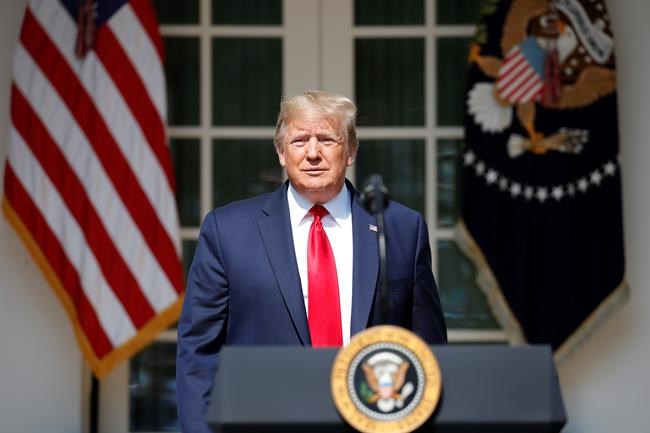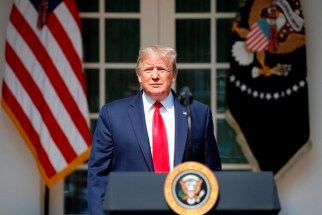With ratification on hold, the old NAFTA prevails
Read this article for free:
or
Already have an account? Log in here »
To continue reading, please subscribe:
Monthly Digital Subscription
$0 for the first 4 weeks*
- Enjoy unlimited reading on winnipegfreepress.com
- Read the E-Edition, our digital replica newspaper
- Access News Break, our award-winning app
- Play interactive puzzles
*No charge for 4 weeks then price increases to the regular rate of $19.00 plus GST every four weeks. Offer available to new and qualified returning subscribers only. Cancel any time.
Monthly Digital Subscription
$4.75/week*
- Enjoy unlimited reading on winnipegfreepress.com
- Read the E-Edition, our digital replica newspaper
- Access News Break, our award-winning app
- Play interactive puzzles
*Billed as $19 plus GST every four weeks. Cancel any time.
To continue reading, please subscribe:
Add Free Press access to your Brandon Sun subscription for only an additional
$1 for the first 4 weeks*
*Your next subscription payment will increase by $1.00 and you will be charged $16.99 plus GST for four weeks. After four weeks, your payment will increase to $23.99 plus GST every four weeks.
Read unlimited articles for free today:
or
Already have an account? Log in here »
Hey there, time traveller!
This article was published 29/07/2019 (2326 days ago), so information in it may no longer be current.
In the 10 months that have passed since Canada, Mexico and the U.S. agreed on a new trade treaty, the Americans have not been able to agree amongst themselves what they want to do about it. For the foreseeable future, the NAFTA treaty we have had for the past quarter-century is the one we will continue to live with.
U.S. President Donald Trump ran for election in 2016 complaining that NAFTA — the North American Free Trade Agreement among Canada, Mexico and the U.S. — was about the worst trade deal ever made because it increased imports into the U.S. He promised to renegotiate or cancel it. As the November 2020 presidential election approaches, he faces a need to show results along that line.
For the opposition Democrats, who now hold a majority in the House of Representatives, a small political advantage may be achieved by denying Mr. Trump the opportunity to claim success in getting rid of NAFTA. For protectionists in the Democratic party, there may also be an advantage in complaining that Mr. Trump’s trade treaty still allows too much trade with Canada and Mexico.
As long as USMCA is not ratified, NAFTA continues to govern trade among the three countries. The Mexican Senate ratified the new treaty six weeks ago; Canada’s government aims to put it before Parliament for ratification in step with its ratification in Washington, of which there is as yet no sign.
Congressional Democrats have negotiated with the U.S. Trade Representative office through the spring and summer, but no agreement was reached on terms that could be presented to Congress. The revised treaty — the Americans call it the United States-Mexico-Canada Agreement or USMCA — cannot take effect until Congress ratifies it. When the U.S. House of Representatives adjourned this week for its summer break, no ratification bill had appeared on the agenda.
As long as USMCA is not ratified, NAFTA continues to govern trade among the three countries. The Mexican Senate ratified the new treaty six weeks ago; Canada’s government aims to put it before Parliament for ratification in step with its ratification in Washington, of which there is as yet no sign.
While the old NAFTA remains in force, Canadians will have to make do with the familiar restrictions on the sale of U.S. dairy products in Canada. Canadian online shoppers will continue having to pay duty on imports worth more than US$20. Canadian copyright laws will remain as they have been and will not be brought into line with those of the U.S. The other small changes that the U.S. compelled Canada and Mexico to accept will also remain in legislative limbo.

Canada has gone through the motions of asking House Speaker Nancy Pelosi to open the way for ratification of USMCA, but the differences between the old NAFTA and new USMCA are so slight that it is hard for Canadians to care much one way or the other. The main advantage USMCA offers Canada is that Mr. Trump thinks it’s his child and as long as he remains in office he will defend it.
He thinks NAFTA is a terrible thing and he will not defend it. Canada is better off with a trade treaty the president of the moment defends. But Mr. Trump’s term of office ends in January 2021 and we have no way of knowing where our interest will lie after that.
In a world of rising trade barriers, Canada needs to keep cultivating new markets and concluding new trade deals. As Mr. Trump has shown, even the United States is not a trustworthy trading partner, and the same may be true of new partnerships we form. For the moment, however, we are not getting kicked in the face every day by the Americans, and that’s an improvement.









